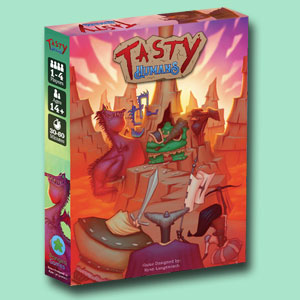Play-testing is the most important part of board game design. It’s how you turn rough, raw ideas into polished, ready-to-play games. It’s also brutally difficult. Play-testing is a labor of love, and sometimes it’s hard to even find play-testers in the first place!
This is a follow-up on last week’s post, How to Turn Your Ideas Into Reality. In that post, I talk about how to get started with intimidating creative projects. In this post, I’ll set my sights on a very specific question: “how do you find play-testers?”
Looking for more resources to help you on your board game design journey?
Here you go: no email required!
Like this writing style?
Check out my latest blog on marketing here.
Things to Remember Before You Find Play-Testers
Before you ask people to play-test your game, bear in mind the following advice.
First, play-testing is labor. Play-testing is hard work because it requires you to take a complex, intricate system and critique it. Many go a step further by suggesting fixes to problems found in play-testing as well. This kind of thinking is similar to management consulting or systems analysis, both of which are jobs that can command high salaries because of how difficult they are.
Because play-testing is hard, respect your play-testers time and opinions. Write down everything they say and keep a good attitude even if you disagree. Don’t argue, just listen. Remember: they’re doing you a huge favor!
Finally, go in prepared. I’ve written about play-testing before and you may find some of these guides helpful:
- 8 Signs Your Game is Ready for Blind Play-Testing
- Playtesting and Record Keeping
- 4 Things to Expect on the First Play-Test of a New Board Game
- How to Play-Test the Core Engine of Your Board Game
- How to Play-Test the Mechanics of Your Board Game
- How To Play-Test the Rules of Your Board Game
- How to Turn Negative Play-Test Feedback into a Brilliant Game
- How to Tell When Play-Testing Feedback is Useful or Not
1. Ask friends and family
The first people you are likely to ask for help play-testing will be your friends and family. After all, they’re the easiest people to reach out to!
You might scoff at this idea, saying that family and friends are not objective enough to provide good feedback, but don’t be so quick to dismiss it. As I’ve said in an old post, play-testing with family or friends – particularly non-gamers – has benefits:
- You play your game with non-gamers.
- You play your game with people who understand what you’re trying to say.
This is to say, family and friends may not be able to tell you whether your game is fun, but they can tell you whether your game is confusing. That’s a huge step in the right direction.
2. Find dedicated play-testing groups online
One of the best places to find play-testers is online, particularly Facebook groups. There are large groups of people who absolutely love play-testing, even though it is often hard work. Reaching out to these enthusiasts is often the best way to find play-testers.
Two groups that come to mind are the Tabletop Game Playtesters Guild and Card & Board Game Designers Guild. You may also be able to find a game design or play-testing group local to where you live as well.
3. Visit your local game store
Speaking of local play-testing, once game stores reopen after the conclusion of the COVID-19 pandemic, you may very well find that your local game stores are a great place to play-test board games. I recommend calling in advance to see if this is something that people would be interested in doing there as a courtesy to the store owners.
This is a great option if you want to observe gamers playing your game in-person or in real time.
4. Create a feedback form and online demo, then advertise and offer prizes
Of course, in-person play-testing isn’t always viable. Maybe you work strange hours. Perhaps you live in a really remote area. Or maybe the world is being forced to shelter in place because of a pandemic.
If circumstances require you to, or if you prefer to, you can always play-test board games online. You can make your game testable online by either creating a print-and-play game or a Tabletop Simulator demo.
From there, you can create a feedback form for people to submit their feedback. You can then advertise your print-and-play or Tabletop Simulator demo, offering prizes to people who submit their feedback. It’s expensive, but it’s an effective way to get feedback online.
5. Run online demos or live-stream your game
Perhaps you prefer a more hands-on approach to digital board game play-testing. If that sounds like you, you can live-stream your game. For best results, I recommend creating a Tabletop Simulator demo and working with people who already stream board games. That way you can play-test with gamers and draw a crowd (who sometimes provide good feedback as well).
6. Go to play-testing conventions
While none of us will be going to board game conventions anytime soon, they will return at some point. When they do, keep an eye out for Protospiel conventions. Protospiel conventions allow board game designers to gather in one place and play-test each others’ board games. I went to one in Atlanta and it was a good experience!
Final Thoughts
Play-testing may be tough, but finding play-testers doesn’t have to be. You can run with any of the suggestions above. Give people a good reason to play-test your game and you may be surprised at just how helpful their feedback is!






6 thoughts on “6 Ways to Find Play-Testers for Your New Board Game”
Hey Brandon. I just wanted to add to this list, Discord playtesting servers. Since March, several local playtesting groups now meet online and have opened up their group to everyone. We’ve been meeting online 3 times a week for over a month. It’s the best and fastest way to get playtesting done nowadays. I would encourage more people to seek out one of these regular groups rather than bribing people (which isn’t sustainable) or dealing with the hassle of scheduling one-off playtests. You do need an internet connection and some way for people to play your game remotely, whether through Tabletop Simulator, Tabletopia, or other methods. One member made his game with a shared Google Slides document!
You can find two of these groups through the twitter accounts of Gil Hova and Emma Larkins.
These are great leads! I may actually go back and edit this post to add your comment into the main text!
Hi Brandon.
How many play-testers would you recommend? Are they supposed to play the game more than once?
Hi Olga, at least as many as the max play count of the game. The general gold standard I like to follow is “play test until the game is consistently fun for blind play testers at every player count.” (It’s high bar, and vague.)
Hi all,. I would love to test any and all of your games. I just started this new hobby and I am LOVING it!! I am always checking my emails for any opportunity!
As well my 7 year old son is a quick learner and loves trying new games.
Hi, i don’t understand how do i get the board game playtested that i made
if i only have one homemade copy of it and i don’t have any money to get other copies or prototypes made? What’s the secret ingredient i am overlooking?